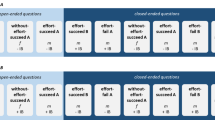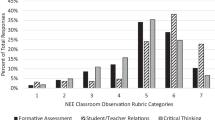Abstract
This study intended to develop a scale that measures teacher attributional feedback, as perceived by students. A total of 513 college students served as respondents in the three phases of the scale development. In the item writing phase, five categories of attributional feedback were identified: lack of ability, lack of self-confidence, lack of effort, lack of self-regulation, and lack of valuing. However, exploratory factor analysis revealed that students were not able to discriminate three of the five constructs, resulting to a two-factor structure: lack of effort and lack of ability. Further confirmatory factor analysis resulted to an improved measurement model that consists four items for lack ability, three items for lack of effort.


Similar content being viewed by others
References
Asmus, A. P., Jr. (1986). Student beliefs about the causes of success and failure in music: A study of achievement motivation. Journal of Research in Music Education, 34(4), 262–278.
Burnett, P. C. (2002). Teacher praise and feedback and students’ perceptions of the classroom environment. Educational Psychology, 22, 5–16.
Burnett, P. C., & Mandel, V. (2010). Praise and feedback in the primary school: Teachers’ and students’ perspective. Australian Journal of Educational and Developmental Psychology, 10, 145–154.
Cooper, C. M., & Burger, J. M. (1980). How teachers explain students’ academic performance: A categorization of free response academic attribution. American Educational Research Journal, 17(1), 95–109.
Gaskin, J. (2014). Confirmatory factor analysis. Retrieved from http://statwiki.kolobkreations.com/wiki/Confirmatory_Factor_Analysis.
Hareli, S., & Hess, U. (2008). When does feedback about success at school hurt? The role of causal attributions. Social Psychology of Education, 11, 259–272.
Hattie, J., & Timperley, H. (2007). The power of feedback. Review of Education Research, 77(1), 81–112.
Karabenick, S. A., & Knapp, J. R. (1988). Help seeking and the need for academic assistance. Journal of Education Psychology, 80(3), 406–408.
Marcotocchio, J. J., & Dulebohn, J. (1994). Performance feedback effects on training: The role of perceived controllability. Personnel Psychology, 47, 357–373.
Mueller, C. M., & Dweck, C. S. (1998). Praise for intelligence can undermine children’s motivation and performances. Journal of Personality and Social Psychology, 75(1), 33–52.
Pajares, F. (2005). Self-efficacy during childhood and adolescence. In F. Pajares & T. Urdan (Eds.), Self-efficacy beliefs of adolescent (pp. 339–367). Charlotte: Information Age Publishing.
Schunk, D. H. (1982). Effect of effort attributional feedback on children’s perceived self-efficacy and achievement. Journal of Educational Psychology, 74, 548–556.
Schunk, D. H. (1983). Ability versus effort attributional feedback: Differential effects on self-efficacy and achievement. Journal of Educational Psychology, 75(6), 848–856.
Schunk, D. H. (1984). Sequential attribution feedback and children’s achievement behaviors. Journal of Educational Psychology, 76(6), 1159–1169.
Schunk, D. H. (2003). Try harder?. ERIC Digest: Motivational effects of effort attributional feedback.
Weiner, B. (1971). A theory on motivation for some classroom experiences. Journal of Educational Psychology, 71(1), 3–25.
Weiner, B. (1985). An attributional theory of motivation and emotion. Psychological Review, 92(2), 548–573.
Author information
Authors and Affiliations
Corresponding author
Rights and permissions
About this article
Cite this article
Nob, R.M. Development and Validation of Teacher Attributional Feedback Scale. Psychol Stud 61, 259–266 (2016). https://doi.org/10.1007/s12646-016-0365-7
Received:
Accepted:
Published:
Issue Date:
DOI: https://doi.org/10.1007/s12646-016-0365-7




